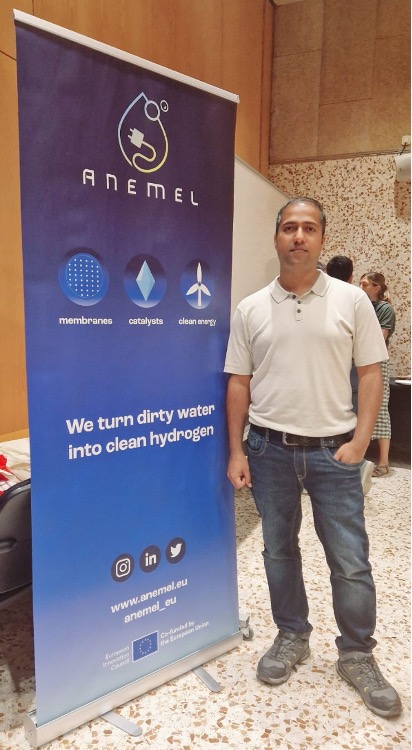Earlier this year, ANEMEL welcomed a new partner – the Jožef Stefan Institute (JSI) in Ljubljana, Slovenia. JSI joined the project through the “hop-on” facility of the European Commission, which promotes partnerships between ongoing projects and research institutions from Widening Countries – regions with traditionally low-participation rates in the Horizon funding framework. In this article, we interview Suraj Gupta, the principal investigator of the JSI team in ANEMEL.
“We decided to join ANEMEL because its objectives fit in perfectly with our research ambitions, related to seawater electrolysis,” explains Gupta. ANEMEL and the “hop-on” funding facility “offered us the opportunity to collaborate with bigger labs in Europe, elevating our expertise in green hydrogen generation,” he adds. Moreover, the programme provides an additional contribution of 322.000€, “ensuring the project pays no financial burden with the widening partner.” This offers a great opportunity to researchers from widening countries, joining important and international research projects.
Slovenia is already considering a strong strategy to support green hydrogen towards a climate-neutral European Union. “Recently, Slovenia set up a National Hydrogen Association to connect companies, research centres, universities, and other key actors involved in hydrogen technologies,” explains Gupta. The region is also heavily invested in the installation of hydrogen valleys, partnerships that promote the deployment of hydrogen “hubs”, which combine different steps in the green hydrogen value chain, from production to applications in mobility, industry, and energy. “The Slovenian company Holding Slovenske Elektrarne leads the North Adriatic Hydrogen Valley programme, in partnership with research centres and companies in Croatia, Italy and Spain,” adds Gupta. “These initiatives highlight the contribution from widening countries is essential to meet Europe’s ambitious climate goals.”

Clean catalysts with abundant metals
The electrolysers in ANEMEL will avoid the use of scarce and expensive metals, such as platinum and iridium. Instead, our researchers will study different alternatives with abundant elements, including iron, nickel, and manganese, to lower both the environmental impact and the current cost of hydrogen generation. Our new partner, the Jožef Stefan Institute in Slovenia has an extended expertise in the discovery and development of bifunctional electrocatalysts for water electrolysis. “A new set of non-noble bifunctional catalysts, based on transition-metal borides, will become our main contribution to ANEMEL,” says Gupta. “We’re well-known for the fabrication of a wide variety of nanomaterials with different applications, including green hydrogen generation.” In particular, the JSI clean catalysts – technically called “amorphous phase bifunctional electrocatalysts”– remain active and stable during water electrolysis, thanks to a surprising structural stability and high surface areas. Additionally, “our suite of advanced materials characterisation tools will be available to all ANEMEL partners,” points out Gupta.
In later stages of the project, these clean catalysts will make it into membranes, then cells and stacks for standardise testing. “The electrocatalysts developed by JSI won’t need any platinum group metals, and will play a key role improving the stability and selectivity of the electrodes in the stack,” explains Gupta. Platinum group metals include palladium, rhodium, ruthenium, and iridium, among others – all scarce elements in the Earth’s crust, therefore expensive and often considered “critical” to the continent’s economy. Reducing the reliance on scarce metals will guarantee sustainability and energy independence in the long-term.
Indeed, “the green hydrogen market in Europe is already quite significant and ready to grow further with initiatives such as RePowerEU,” adds Gupta. Hydrogen could find applications in industries such as the production of steel, chemicals, cement, and more. Furthermore, “with a substantial number of artificial energy islands coming up across the coastal regions of Europe, seawater-based electrolysers will become a crucial technology to produce green hydrogen with off-shore wind and solar energy.” That is, in fact, one of the obvious advantages of ANEMEL. “The use of low-grade waters, including saline water, as the fundamental feedstock, makes our idea more robust and sustainable than any of the existing technologies in electrolysis,” says Gupta. Sustainability is surely significant for ANEMEL, beyond clean catalysts and the utilisation of seawater and wastewater. “Our membranes will be free from fluoroalkyl substances and forever chemicals, and we will considers recycling used metal electrodes wherever possible, to boost circularity and reuse,” continues Gupta.

JSI will also contribute to the communication and dissemination efforts of ANEMEL and, among other things, will host a summer school in Slovenia that will involve not only our own project, but also participants from the portfolio of projects funded by the European Innovation Council (EIC) through the EIC Pathfinder challenge call “Novel Routes to Green Hydrogen Production“, launched in 2021. Recently, the EIC further showcased its support of the “hop-on” facility and the widening countries, with a visit of the EIC Board President Michiel Scheffer to JSI. “It was a great pleasure to receive EIC Board President Michiel Scheffer at the Jožef Stefan Institute, and showcasing our contribution to ANEMEL with our work towards developing more sustainable nanomaterials for green hydrogen generation”, concludes Gupta.
